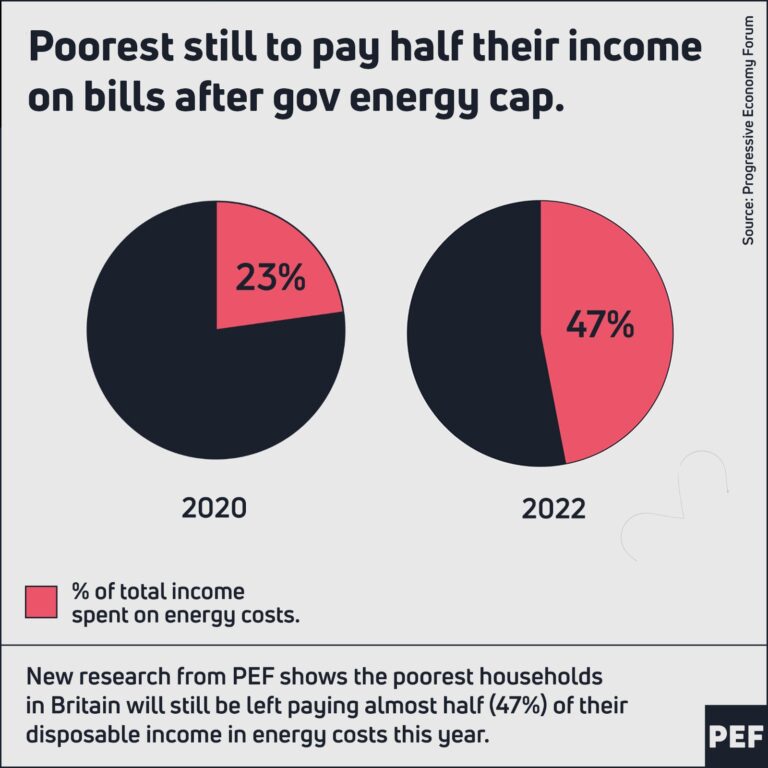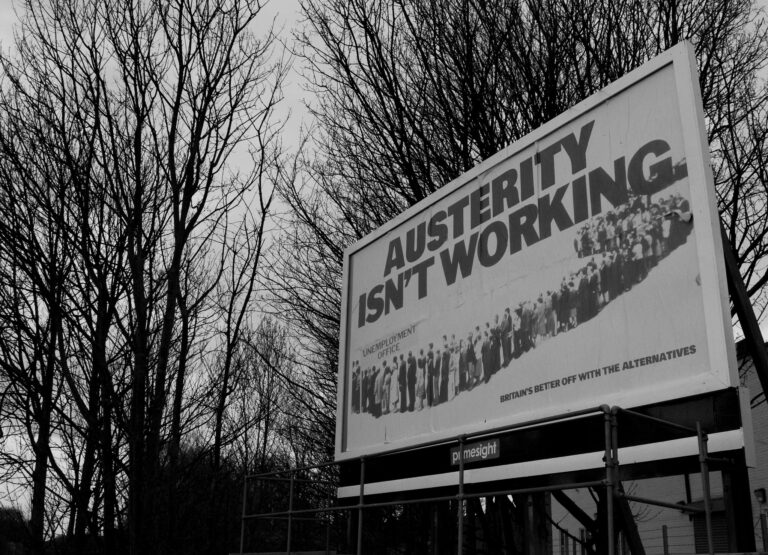“Pandering to the ideas of a fragmented Conservative Party, rather than the needs of Britain as a whole, makes as much sense as managing an allotment entirely for the benefit of the whitefly.”
At the Conservative Party Conference, Prime Minister Theresa May pledged to “end” austerity; more recently, Chancellor Philip Hammond announced that a “good” Brexit deal would “pave the way” for this. But he is also committed to “cutting public borrowing to zero” and “balancing the books” – both code for more austerity.
So let’s get rid of any lingering suspense right away: austerity isn’t over yet – and it’s unlikely that the Budget Statement on the 29th of October will change that. Indeed, Mr Hammond is getting his excuses for continued austerity in early, such as the possibility of a poor Brexit agreement.
But why persist with austerity? It’s clearly not working. And if the need for immediate cuts in 2010 was as urgent as George Osborne assured us it was, we might have expected to see at least some sign of a positive effect in the space of nearly a decade. Since we haven’t – with the deficit remaining a deficit and national debt continuing to be largely unaffected – what’s the point of continuing with austerity?
A cursory look at economic history soon reveals that opting for austerity in a recession will, as we have been reminded since 2010, actually make things worse. Even the feeding frenzy of market panic, predicted by Osborne if there was no credible plan for reducing debt, has failed to materialise – in spite of his plan turning out not to be credible.
Don’t make promises you won’t keep
So could Hammond really bring an end to austerity on the 29th? Whilst tax increases are widely expected in the budget, the mere mention of higher taxes could be enough to further destabilise an already fragile government – highlighting the sharply political (rather than economic) basis of austerity. May’s attempts to undermine Labour’s campaign in the run-up to the 2017 general election – by apparently embracing more progressive policies – also clearly demonstrates the influence of politics on policy; mere weeks after the election, May was making a speech in praise of free market capitalism.
This “U” turn may provide a clue as to the real meaning of “ending austerity”, which may well just mean “not calling it austerity anymore”. If we take this and the failure to address Osborne’s cuts (some of which are yet been implemented) at face value, it’s hard to see how Hammond can change the game in one budget speech – or half a dozen, for that matter. More of the same, in terms of policy, will simply mean more of the same in terms of economic and social outcomes. So we clearly need something better.
Growing out of debt
As it happens, there is a much better way to deal with public debt – and for that matter, a questionable “Brexit” arrangement, if any at all. It’s called economic growth. A quick look at the various policy responses to the Great Recession reveals that countries which delayed austerity until the economy was in a sustainable recovery – like Iceland, Ireland and the US – were all able to afford a modest reduction in spending without damaging growth. In the cases of Iceland and Ireland, the brunt of austerity was borne by those who could best afford it. Society was prioritized over finance, and the social and political unrest experienced elsewhere was avoided. Contrasting this with the humanitarian crisis in Greece, the rise of “populism” across Europe, and the all too familiar effects of prolonged austerity in the UK, demonstrates the stark difference between austerity in a growing economy, and austerity in a fragile one.
Following Labour’s initial response to the 2008 crisis, the UK was actually experiencing the beginnings of a recovery. But the following Chancellor, Mr. Osborne, decided to go all Tony Blair – “tough on growth, tough on the causes of growth” – a strategy that predictably brought no positive results (but plenty of undesirable ones) for almost a decade.
Economic growth has very obvious benefits. For a start, it’s the only way out of a recession – a recession being defined as two or more successive quarters of negative growth. A growing economy will drastically reduce social welfare costs, and will also significantly increase the government’s tax receipts. Both these things will rapidly improve the deficit, and hence, public debt. This has been the case ever since governments committed themselves to income tax and welfare spending at the beginning of the last century – which is why, if Hammond continues with existing policy after the 29th, he (like Osborne) will be flying in the face of a century or so of economic reality.
Austerity: past its sell-by date
The popular arguments for austerity have been out of date for at least a hundred years. No longer can a nation’s budget be convincingly compared to that of a family or business – nor can state borrowing “crowd out” private investment. Before the 2008 financial crisis there was, after all, enough credit left over to fund yet another bubble of prodigious size. The economic equivalent of the unicorn – the dream of “expansionary fiscal consolidation” – has also been laid to rest by the two most recent UK chancellors. And unless you happen to be a member of the Eurozone, situations like that in which Greece found herself are extremely unlikely.
None of this, of course, means that we won’t still be hearing these arguments for many years to come. But whilst they might have made a degree of economic sense when the likes of Adam Smith and David Ricardo were writing, since that time the world – and economics – have changed out of all recognition. Thus, during the 1930s, when John Maynard Keynes was writing, he didn’t in fact come up with a new theory of the economy – rather, he produced a theory of the new economy. His conclusion was clear, too: “austerity is the policy for the boom, not the slump”.
Our economy needs a gardener
So where does all this leave us? It strongly suggests that what we need is a Prime Minister who knows all about growth. So whilst Jeremy Corbyn has taken a certain amount of stick from the media for tending his allotment, he will be acutely aware that with his tomatoes and potato beds, cutting back on feed and “expansionary” fertiliser before the crop is well established will have disastrous results. He will also appreciate the utmost importance of the environment, and the need to both invest in its protection and ensure that growth is ‘sustainable’ in the fullest sense of the word.
Without growth, it’s hard to see how either our economy or society can improve. But the last eight years of austerity have been driven more by political than economic considerations. Pandering to the ideas of a fragmented Conservative Party, rather than the needs of Britain as a whole, makes as much sense as managing an allotment entirely for the benefit of the whiteflies, red spider mites and caterpillars.
It’s conceivable that Mr. Hammond will talk about expansionary policies on the 29th and actually mean what he says; but given the political rhetoric of the past eight years, it seems unlikely. What we really need now, is a government that is serious about progressive policies for the many – and that means actually ending austerity.
Photo credit from previous page: Flickr / kas d








